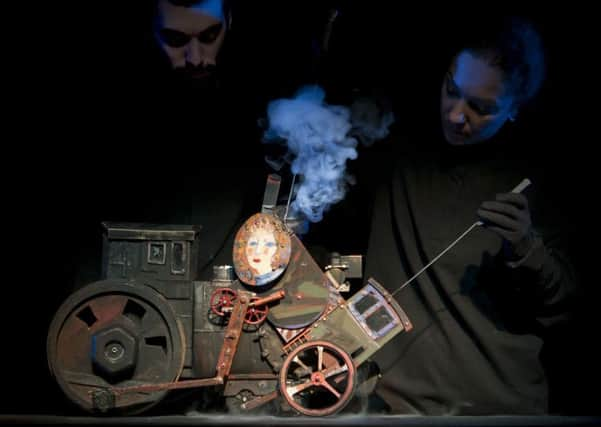Joyce McMillan: The GIFT Festival in Tbilisi is a triumph of the creative spirit


Then, in the 1980s and 90s, William Burdett-Coutts of Assembly, at the Edinburgh Fringe, began his long creative relationship with the Georgian Film Actors’ Studio at the Tumanishvili Theatre, and with the inspirational Keti Dolidze, its artistic director since 1996. Together, they brought to Edinburgh superb productions of classics including Don Juan, A Midsummer Night’s Dream, King Lear and Antigone; and in 1997, they decided to launch the Georgian International Festival of Theatre, known as GIFT not only after its English acronym, but because – as Dolidze always insists – it was a gift from all the friends of Georgian theatre, in the UK and elsewhere.
It wasn’t that 1997 was an easy year in Georgian history. When I travelled to see two early GIFT festivals, in the late 90s, the city centre was still bullet-marked from the conflicts that flared during the break-up of the Soviet Union, and most of the hotels were full of refugees from the Russian border regions of Abkhazia and South Ossetia; we festival visitors stayed in people’s homes, since hotel rooms were so scarce.
Advertisement
Hide AdLike the Edinburgh Festival, though, GIFT was born out of a determination to build a new peace, after a period of war; and over the past 19 years – through good times and bad, including a four-year period when the festival was suspended by one post-Soviet Georgian government – GIFT has gradually grown into the one-month celebration of international arts it is today, with world-class companies from Spain, Russia, Georgia, the USA and Germany taking part this year, alongside an Italian season produced with the support of the Italian Embassy.
So today, from the window of my high-rise hotel, I can see the traces of all the tides of history that have swept across this ancient city, with its magical hot sulphur spring in the heart of the old town, its wonderful churches and mosques, its sweeping 19th century avenues, its share of functional Soviet-era architecture, and – since 1997 – a whole new wave of spectacular 21st century development, glittering commercial towers that now dominate the modern city centre. Yet despite this recent wave of modernisation, Georgia’s troubled history of stubborn survival in the face of invasion and occupation from all directions is far from over. Today, the nation – with a population smaller than Scotland’s – finds itself sandwiched between Putin’s Russia and Erdogan’s increasingly assertive Turkey, and increasingly alarmed by destabilising events like Brexit, and the rise of a new, inward-looking nationalism across the West.
Over at the Tumanishvili Theatre, though, Dolidze and the GIFT festival are rising to the challenge of these latest troubled times with their usual flair, helping to put Georgian theatre on the international map, and introducing Georgian audiences to an impressive range of international work. In four days in Tbilisi, I saw a superb production of Heiner Muller’s controversial Medea Material by Italian company Proxima Res, featuring a stunning solo performance from Mariangela Granelli; and a thrilling, emotional King Lear from the Tumanishvili company itself, full of a profound Georgian sense of how family feeling remains an irresistible driving force, even at times when the generations are torn apart by history. Outside the festival, I spent a magical evening at Gabriadze’s beautiful Tbilisi puppet theatre, watching a show called Ramona, about two railway engines, that mysteriously combines a gorgeously simple romantic story – and some wonderful, hand-made object theatre – with a sweeping sense of 20th century Soviet history, and the role in it both of heavy industry, and of touring circuses.
And finally, there was a chance to glimpse an open rehearsal of the great Russian director Dmitry Krymov’s version of Lermontov’s The Demon, a story set in Tbilisi about a dark demon of death who falls in love with a maiden so good and beautiful that her influence transforms him, and the world. Krymov’s version of A Midsummer Night’s Dream won huge plaudits at the Edinburgh International Festival of 2012; and here, using his unique method of working with a team of design students and young performers, Krymov uses the story of The Demon to create an unforgettable series of reflections on the recent history of Russian and Georgian culture, with one hugely powerful sequence showing a Stalin-era KGB man stamping out and destroying as much of Georgia’s glorious cultural heritage as he can reach.
It’s difficult to overstate the emotional impact of watching this show in Tbilisi’s old town, in the beautiful galleried space of the old Caravanserai museum there; of seeing a Russian company come to Georgia, and use the power of theatre to acknowledge so much of the pain of the last 100 years of history. “It was a gift to humanity,” said one Italian company member, after the show. And like all great festivals –including Edinburgh, at its magnificent best – GIFT is about these mutual acts of giving; allowing the great tradition of Georgian theatre to give itself to the world, and demonstrating to this great and beautiful city that the world does not always arrive to invade and conquer, but sometimes comes to sing, laugh, weep and celebrate, to heal the wounds of history, and to face the future together. ■
*The GIFT Festival takes place in Tbilisi, Georgia, every October and November, www.giftfestival.ge
*Joyce McMillan’s visit to Tbilisi was supported by the Georgian National Tourism Administration